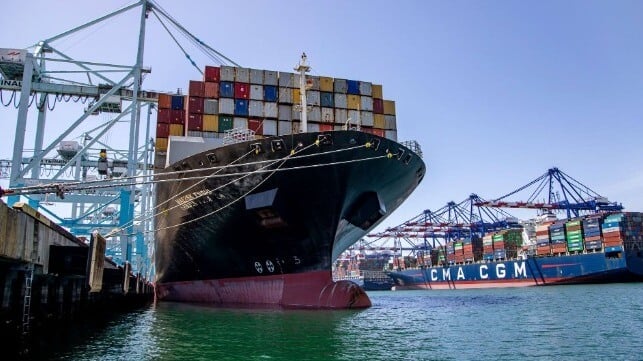Importers Begin to Cut Orders After 145 Percent Tariff on China

American importers are beginning to delay or cancel orders in China due to the White House's new 145 percent tariff on Chinese goods - and some U.S. firms may even abandon import cargo on the dock because they can't afford to pay the extra duties, though the White House has promised an exemption for goods already in transit.
Even before the latest hike, Chinese manufacturers faced a tariff of 20 percent from earlier White House actions. Many have already discounted their goods to the lowest profitable price in order to offset the effects. "It is a deal breaker," toy factory owner Chen Qingxin told the Wall Street Journal. "No room for doing business anymore, for both sides."
Given the effective doubling of their wholesale costs, American retailers are already beginning to cancel or defer orders. E-commerce giant Amazon began to revoke orders this week, according to Bloomberg, and has already canceled shipments of summer goods like air conditioners, beach chairs and scooters.
Exporters in China are also adapting to a new reality. "All factory orders are suspended. Any goods that have not been loaded will be cancelled and goods that are already at sea will be re-priced," one manufacturing executive told SCMP. "The loss on each container we ship is now greater than the profit we used to make on two containers." He added that his firm has heard from at least one U.S. client that the goods would be abandoned on the dock when they arrived because the tariffs make them too expensive to sell.
"The major trend we see is shippers looking to not accept their freight," supply chain consultant Joseph Esteves told CNBC. "A lot of these companies are levered financially. They don’t have the working capital requirements and they don’t have the cash. So they simply cannot just take on this [tariff] and hope to see what happens."
The steep tariff on China may force U.S. importers to diversify their supply chains to other alternatives, like Cambodia and Vietnam, already popular options for the "China plus one" diversified sourcing strategy. But there is little chance that more low-end consumer goods will end up being produced in America, some in the supply chain business say.

that matters most
Get the latest maritime news delivered to your inbox daily.
"They’re absolutely not going to go back to the United States," said Casey Barnett, president of the American Chamber of Commerce in Cambodia, told CNBC. "I can’t imagine that Americans want to sit down and sew a pair of sweatpants for long hours of the day."
China has also imposed its own retaliatory tariff of 84 percent on U.S. goods, and the increased cost is expected to hit agricultural interests hard, particularly soybean farmers. U.S. manufacturers may also feel the effects of a slowdown. In California, a leading maker of CNC industrial machine tools - Haas Automation - has announced that it is scaling back hiring, production and overtime because of a "dramatic decrease in demand for our machine tools from both domestic and foreign customers."
